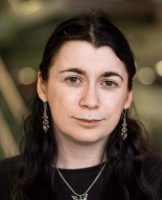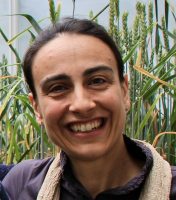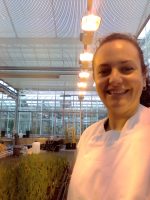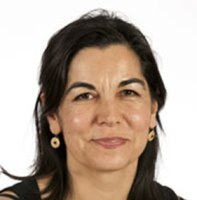Steering Committee

Stéphanie Swarbreck - Chair
NIAB
Stéphanie is a group leader in Crop Molecular Physiology based in the Pre-Breeding Department at NIAB. She is interested in understanding how plants integrate and respond to different environmental conditions such as nutrient availability and the presence of neighbour (e.g. weeds). Her research aims to provide useful information for the development of crop varieties (especially wheat) that can produce high yield with lower herbicide and fertiliser inputs. Through collaboration with Ethiopia and India, she has strong interest in millet species (e.g. foxtail millet, pearl millet and finger millet) as well as tef (Eragrostis tef).

Philippa Borrill
John Innes Centre
Philippa is a Group Leader at the John Innes Centre working on wheat genetics and genomics. Prior to this she was a Lecturer at the University of Birmingham. Philippa has been involved in international efforts to generate functional genomic resources for wheat including gene expression atlases and genome sequences. Her current research interests span from seeking to understand the fundamental regulation of polyploid genomes through to identifying breeding targets to improve the nutrient content of wheat. She is particularly interested in how the gene copies within the wheat genome interact to determine gene expression levels and ultimately plant phenotype.
Twitter: @PhilippaBorrill | Website: Dr Philippa Borrill | John Innes Centre (jic.ac.uk)

Amanda Burridge
university of Bristol
Amanda is a molecular biologist working in the University of Bristol Functional Genomics group. Her current research interests focus on the application of sequencing and genotyping technologies to better address the issues faced by crop breeding with a strong focus on wheat. Her group have worked to generate wheat based molecular tools on a range of platforms to allow the accurate detection and tracking of useful genetic variation in a high throughput manner. The most
recent development being a new wheat Axiom genotyping array.

Elizabete Carmo-Silva
Lancaster University
Elizabete is an expert on the regulation of carbon assimilation by Rubisco in crop plants, especially wheat and cowpea. She leads a research team that aims to understand and improve the efficiency of photosynthesis to optimise the sustainability and climate resilience of crop production. She received her undergraduate degree in applied plant biology at the University of Lisbon, where she went on to earn her PhD researching photosynthesis and photorespiration in C4 grasses. She specialized on the regulation of Rubisco by its molecular chaperone Rubisco activase as a postdoctoral researcher with the USDA-ARS, then started exploring this knowledge for crop improvement as a research scientist at Rothamsted Research. She joined Lancaster University in 2015 to start a research group that focuses on Rubisco regulation in crops.

Laura Dixon
University of Leeds
Laura is a lecturer in Crop Genetics and Physiology and UKRI Future Leader Fellow at the University of Leeds, UK. She received her PhD from the University of Edinburgh (understanding plant circadian rhythms) and her Bachelor’s degree from the University of Cambridge (Natural Sciences). Her research group works to understand how cereals respond to temperature signals and use this knowledge to adapt and increase the robustness of the plants developmental response to these signals. The group’s work combines fundamental discovery science at the molecular and genetic level with the translation of this into realistic in-field environments. Their work focuses on reproductive plant biology including the vegetative to floral transition, floret formation and flowering time regulation.

Carmen Escudero-Martinez
University of Dundee
Carmen is a postdoctoral researcher in Davide’s Bulgarelli Lab at the Plant Sciences Division of the University of Dundee. Her research focus in unravel the plant genetic determinants of the rhizosphere microbiota in barley. For that, she used a combination of plant genetics and microbial metagenomics. She received her bachelor’s in environmental sciences at Castilla-La Mancha University (Spain), Master’s in Nematology at Ghent University and Wageningen University, and earned her Ph.D. in molecular plant-insect interactions at Dundee University in 2018.

Rachel Goddard
Limagrain
Rachel studied Genetics at Leeds University, before completing a PhD in cereal pathology at the John Innes Centre in 2015. After her PhD, Rachel worked as a research scientist to identify sources of resistance to fungal pathogens of wheat, before joining the plant breeding company Limagrain in 2021 as a Cereal Pathologist. At Limagrain, she assists in the formulation of new resistance breeding strategies and provides pathology information and support to both breeders and commercial teams.

Surbhi Grewal
University of Nottingham
Surbhi’s research is aligned with the Nottingham BBSRC Wheat Research Centre where a pre-breeding programme is being carried out to introduce genetic diversity from wild relative species into bread and durum wheat. Her research involves using chromosome-specific molecular markers and techniques to identify and track introgressions from various wild species in novel germplasm. Her lab is particularly interested in finding new beneficial traits, such as salt tolerance and rust resistance, in the introgression lines that originate from the presence of wild relative segments.

Joshua Ham
RAGT
Joshua works for RAGT as a Wheat Breeder. His role involves developing new wheat varieties adapted for the UK market and introducing new traits into the breeding programme. Prior to joining RAGT, Joshua completed his MSc in Plant Genetics and Crop Improvement at the John Innes Centre.

Carus John-Bejai
KWS
Carus is the wheat pre-breeder at KWS and is based in the UK. His team’s works aims to identify, and then introduce, desirable allelic variation that is either absent or unrepresented in KWS’ elite wheat breeding pools. This is achieved through intraspecies hybridization, pedigree selection and whole genome SNP fingerprinting. Carus received his Ph.D. in Crop Science from the University of Nottingham in 2018. Prior to this he pursued an MSc in Crop Improvement and a BSc in Biology at the University of Nottingham and the University of the West Indies respectively.

Tim Langdon
University of Aberystwyth

Christophe Lambing
Rothamsted Research
Christophe is the Head of Group of Plant Genetics at Rothamsted Research. He received his PhD at the University of Birmingham before doing a Postdoc in the Department of Plant Sciences at the University of Cambridge where he studied meiosis. In 2021, he set up his independent research group. His two main research areas are on deciphering the molecular mechanisms that control the pattern of meiotic recombination in germ cells and stabilising yield under climate change by increasing thermo-tolerance of the reproductive tissue. His group uses Arabidopsis for fundamental discoveries and translates findings into wheat to accelerate breeding.

Paul Nicholson
John Innes Centre

Miriam Schreiber
James Hutton Institute
Miriam is a computational biologist at the James Hutton Institute. After her undergraduate at the RWTH Aachen in Germany she moved to Dundee in Scotland for her PhD and stayed on. Her research experience includes all kinds of “Omics” datasets in barley research. Miriam’s latest work as part of the University of Dundee involved the combination of phenotypic, genotypic and expression data in a big association study on spring barley cultivars. At the James Hutton Institute she is working as part of the Information & Computational Sciences Department along multiple research groups, studying the barley pangenomes and pantranscriptomes.

Paola Tosi
University of Reading
Paola is an Associate professor in Crop Science in the School of Agriculture, Policy and Development at the University of Reading. She has over 20 years experience working in cereal research, with focus on processing quality. A large part of her research effort has aimed at understanding the deposition kinetics of storage proteins and of cell wall components, how theses relate to the development and differentiation of the various grain tissues and to the amount, distribution and chemical characteristics (particularly polymerizing behavior) of gluten protein and cell wall polysaccharides in the mature grains. Increasingly the emphasis of her research is on how environmental effects (biotic and abiotic stresses, crop nutritional inputs) impact on final grain yield, grain processing quality and nutritional characteristics.
